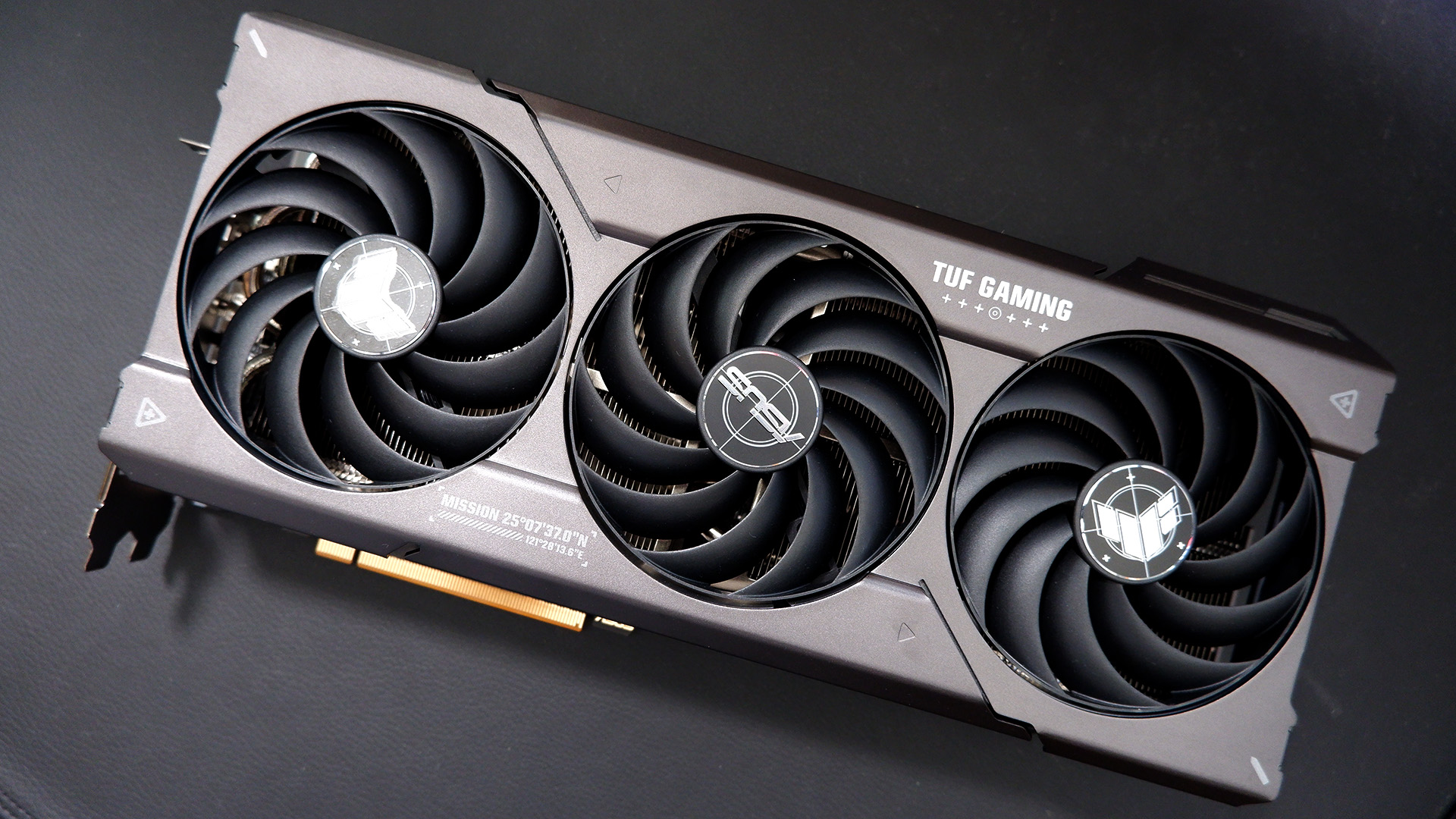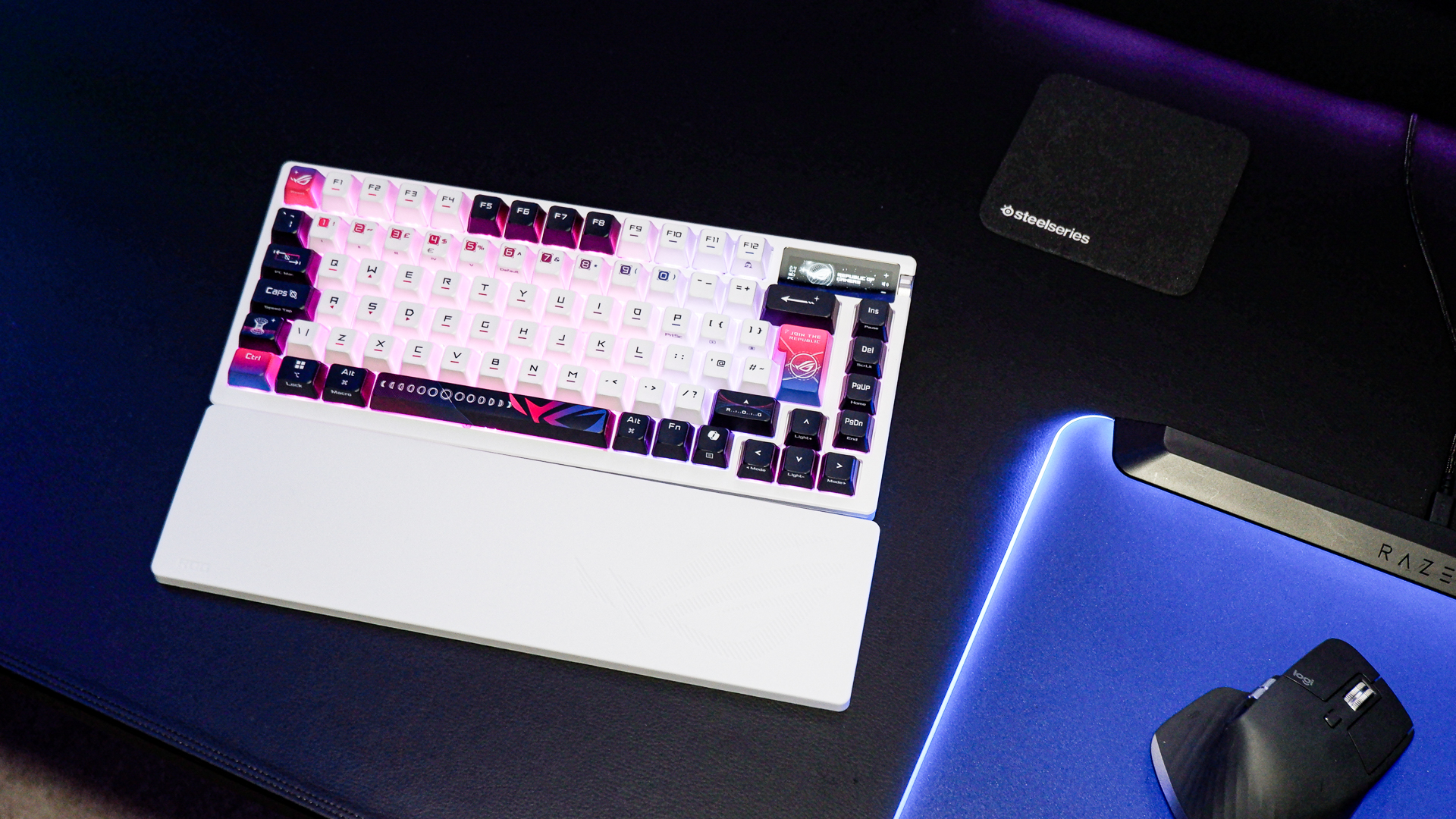Our Verdict
A monstrous shroud keeps the TUF Gaming RX 7800 XT OC Edition extremely cool for barely a whisper. And it's not too prohibitively priced in the US for its big build.
For
- Very cool
- Low noise
- An actually decent value GPU, in 2023?!
Against
- The reference RX 7800 XT is better value
- High UK price
PC Gamer's got your back
The AMD Radeon RX 7800 XT is the graphics card to buy at $499/£480, even making Nvidia's GeForce RTX 4070 look positively pricey by comparison. But is it a GPU worth buying when you slap on a chunky triple-fan cooler, a factory overclock, and a premium price tag? That's the big question to ask when considering this TUF Gaming RX 7800 XT OC Edition. It's faster than the reference AMD design, much cooler too, but it eats up a chunk of the RX 7800 XT's price advantage over the RTX 4070.
The TUF Gaming OC Edition is an absolute monster of a mid-range graphics card—if you can really call it mid-range. As Dave mentions in his review of the reference RX 7800 XT, "Though it is essentially now the middle of the Radeon RDNA 3 line up, calling the RX 7800 XT mid-range doesn't sit well with me." I totally agree, and that's even more true of this $520 TUF Gaming model.
You do get a lot of graphics card for your money. The Navi 32 GPU comes buried under a cooler design more or less plucked off a TUF Gaming RX 7900 XTX OC Edition. For its tremendous size—it's near-enough a triple-slot card—this cooler is more or less unbothered by the RX 7800 XT's chiplet GPU even while it's running full steam ahead. It only reached a peak temperature of 56°C during three runs of Metro Exodus: Enhanced Edition at 4K during my testing, which makes it one of the cooler cards we've tested in recent years.
Thanks to this overprovisioning of the cooler, the TUF Gaming RX 7800 XT doesn't need to run anywhere near as loudly as slimmer cards. The three fans keep to a low ebb even during demanding benchmarking runs and long gaming sessions.
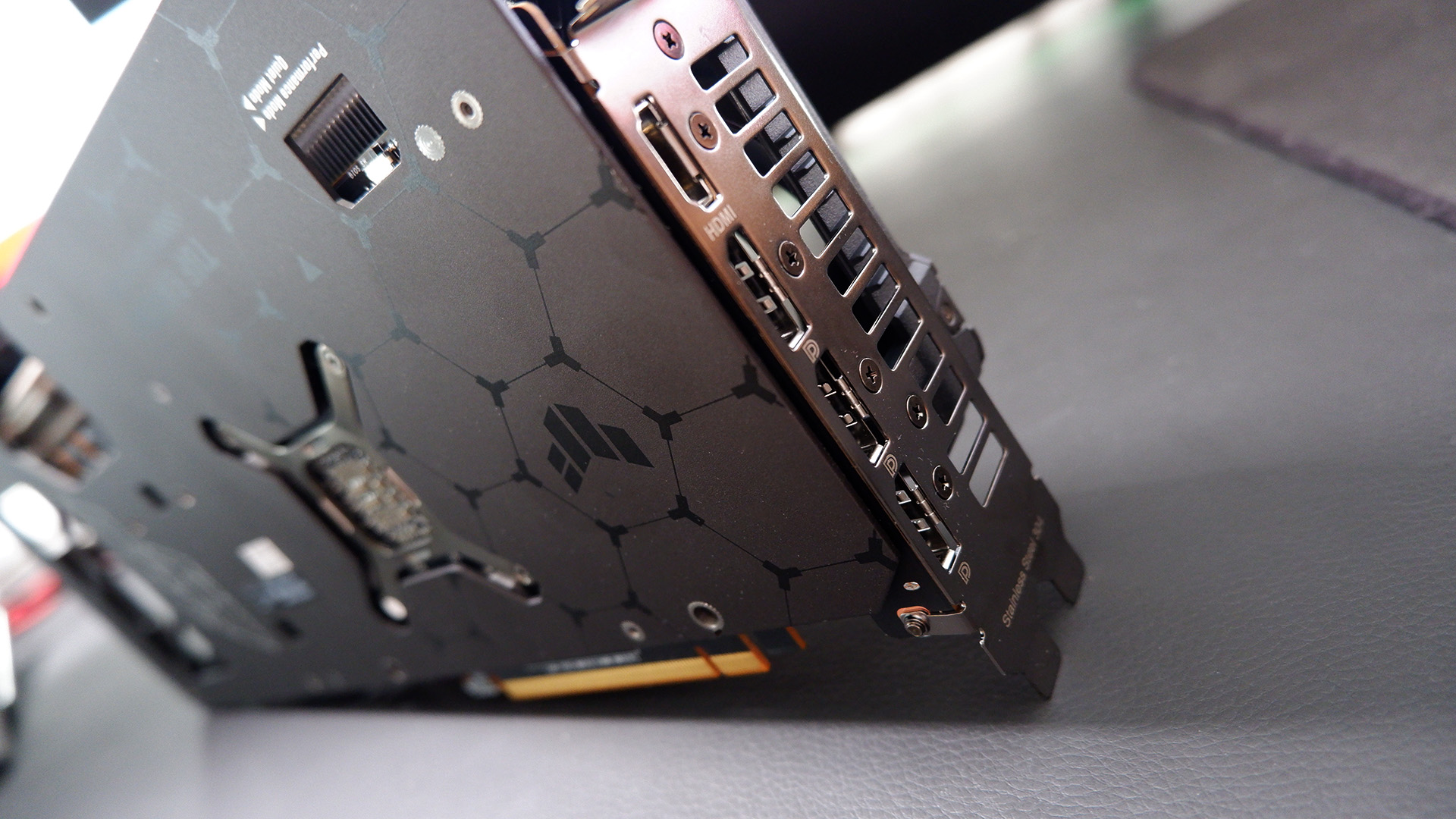
GPU: Navi 32
Stream processors: 3840
Clock speeds: OC Mode, up to 2565 MHz (Boost Clock), up to 2254 MHz (Game Clock)
Memory: 16GB GDDR6
Memory speed: 256-bit
I/O: HDMI 2.1 x1, DisplayPort 2.1 x3
Power connectors: 2x 8-pin
Size: 2.96 slot
Dimensions: 319.8 x 150.9 x 59.2 mm (12.6 x 5.94 x 2.33 inch)
Recommended PSU: 750W
Price: $520/£550
For the thermal or noise sensitive gamer, I get the appeal. It's supremely quiet. In terms of performance, this thermal headroom leaves room for fairly comfortable overclocking beyond the factory overclock, too.
In testing, the TUF Gaming runs a little under 150MHz faster than the reference model, though that varies by game and whether you've set the card to Performance or Quiet mode—switched via a physical switch on the back of the card. All my testing has been with Performance mode enabled, namely for the fact the card is so quiet and cool the Quiet mode seems unnecessarily restrictive.
The TUF Gaming's GPU clock bump only improves frame rates by a small margin in most games—a couple of frames here or there, generally.
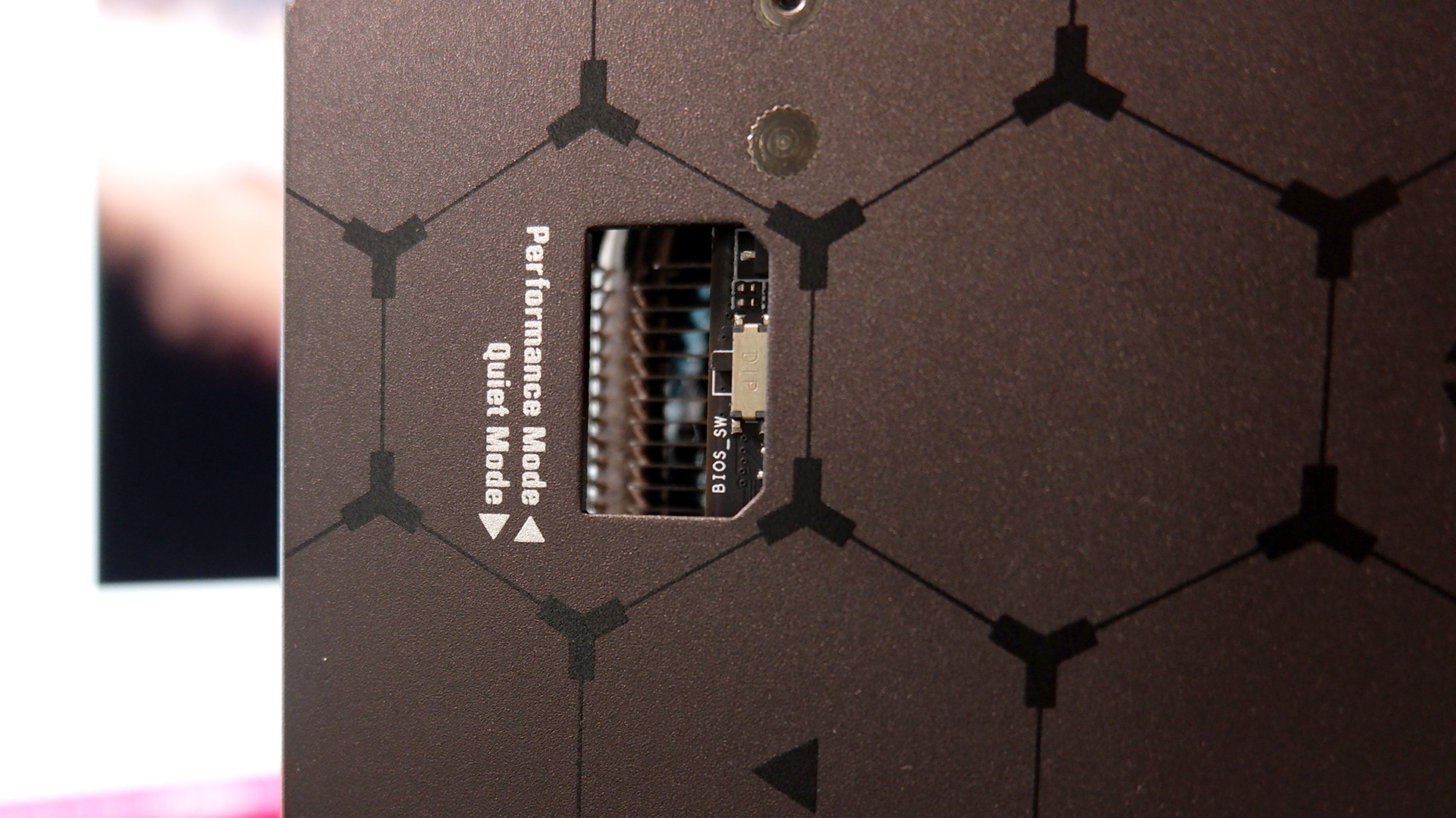
1080p performance
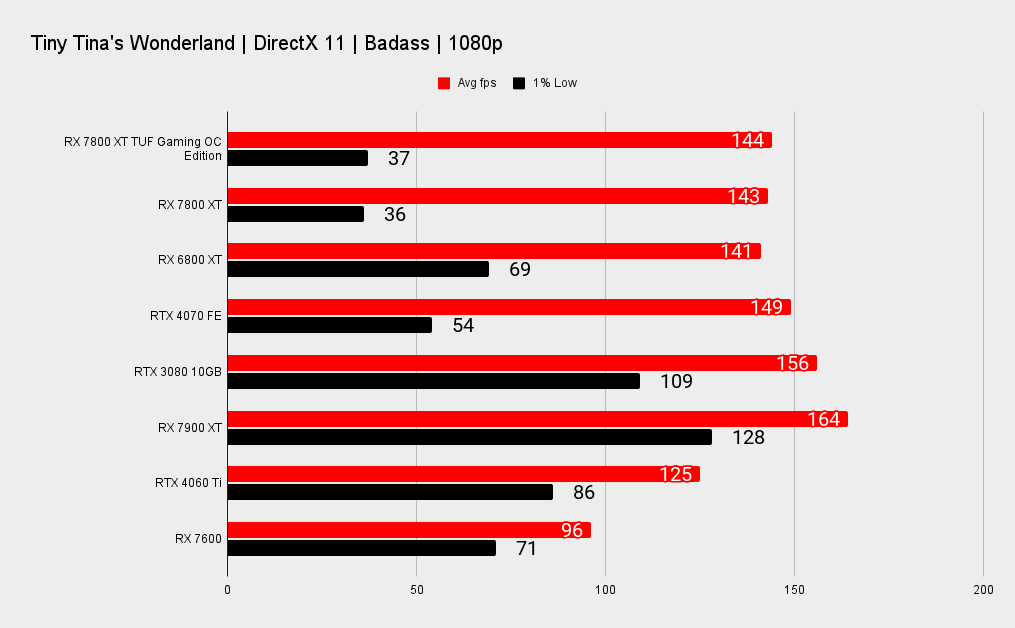
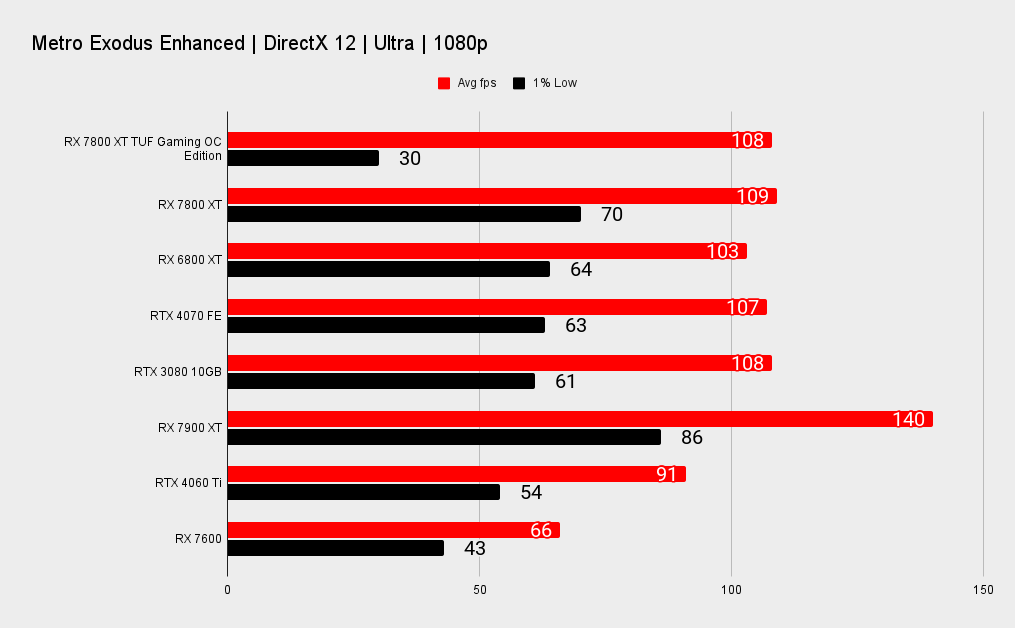
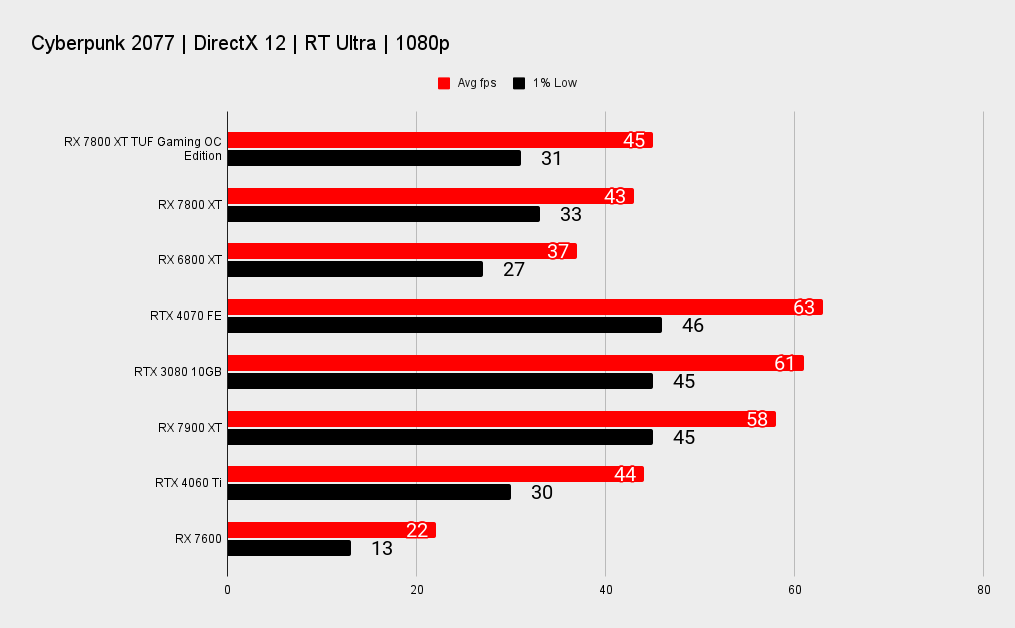
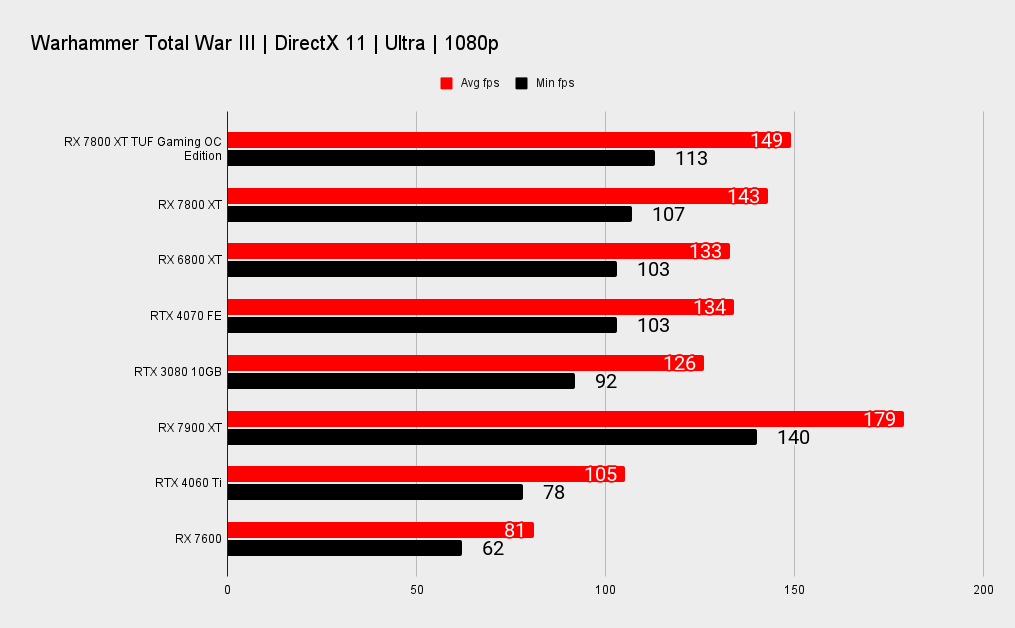
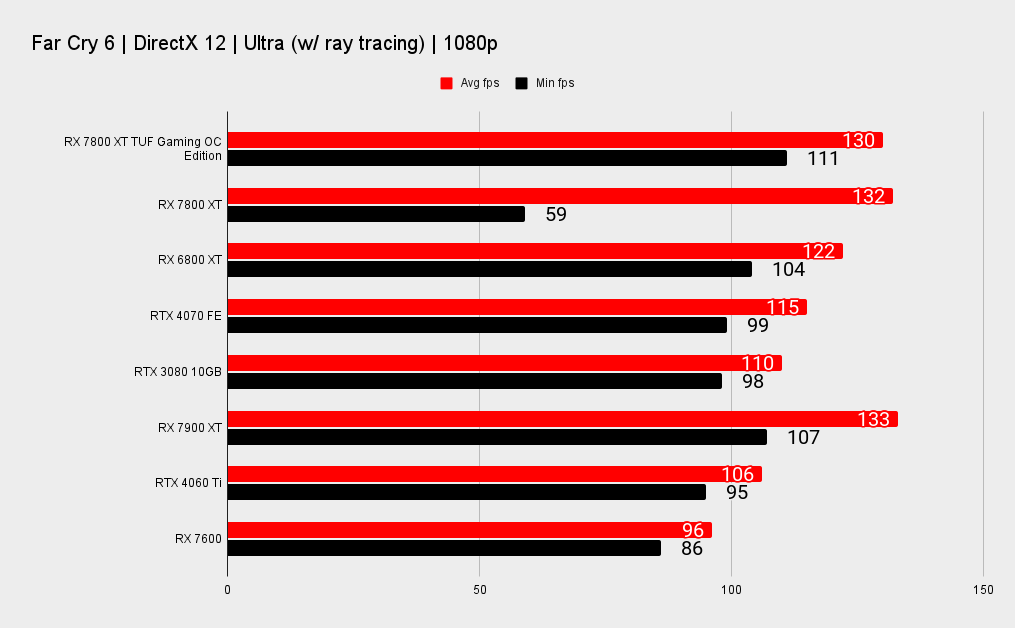
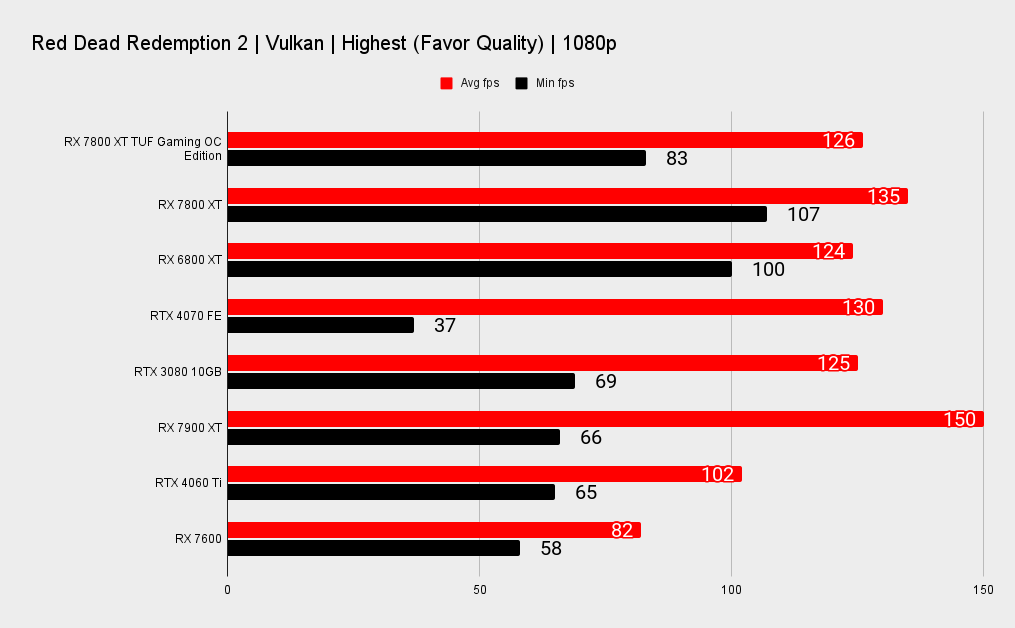
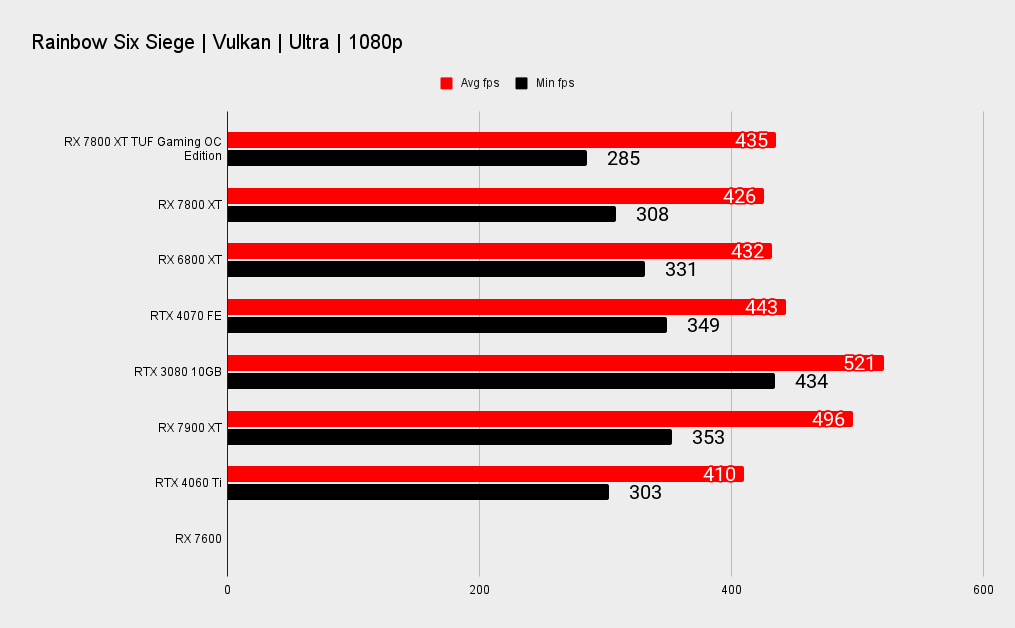
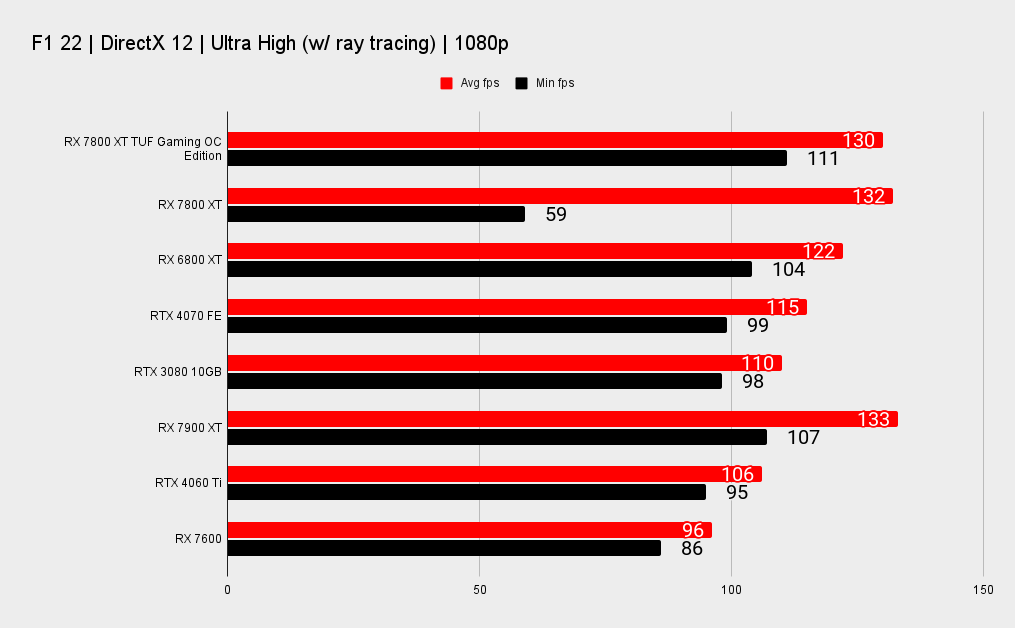
1440p performance
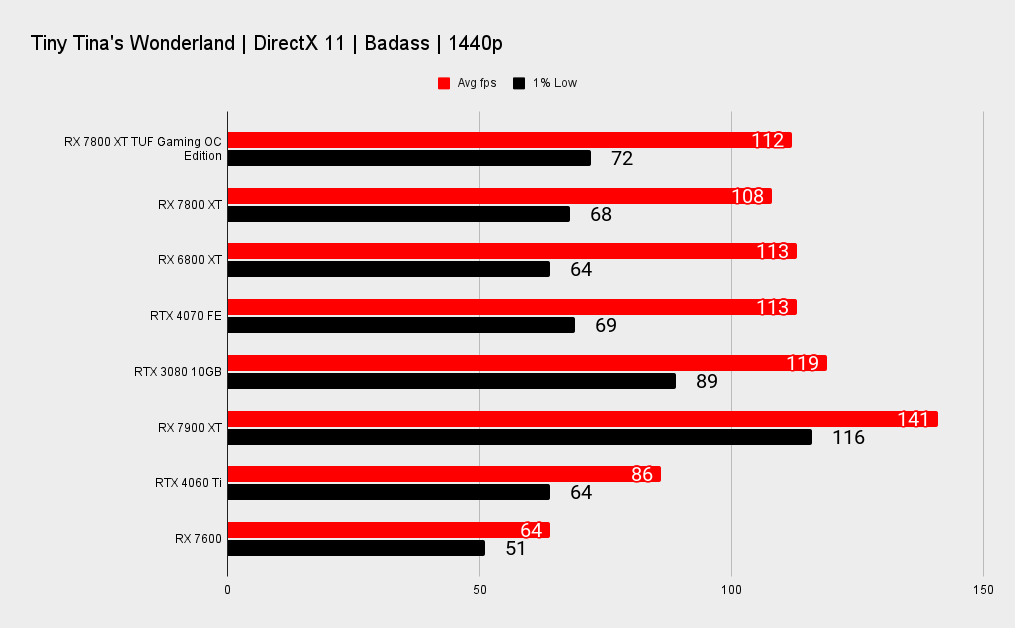
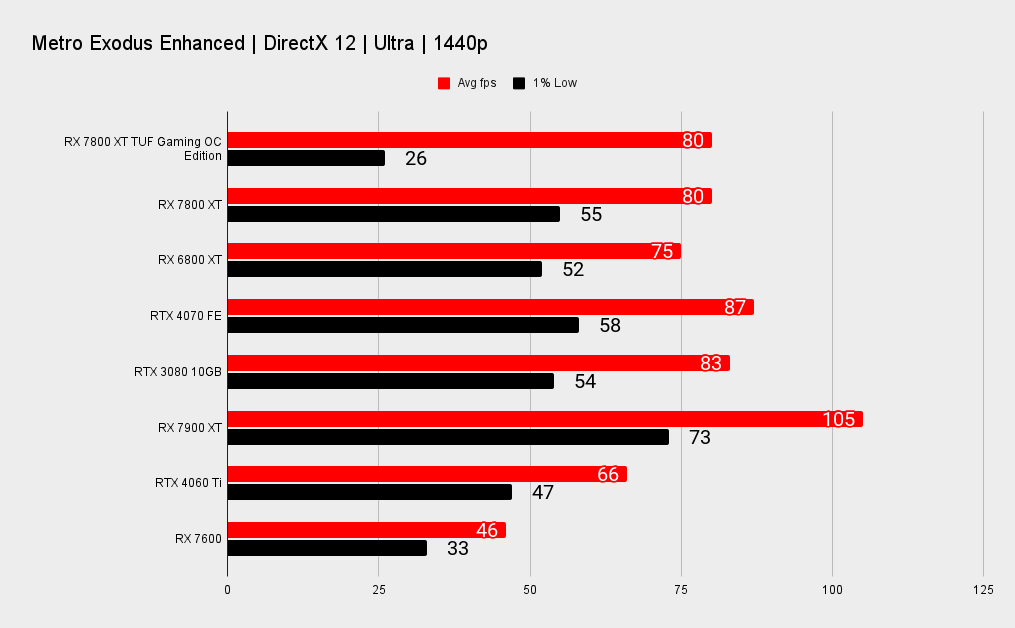
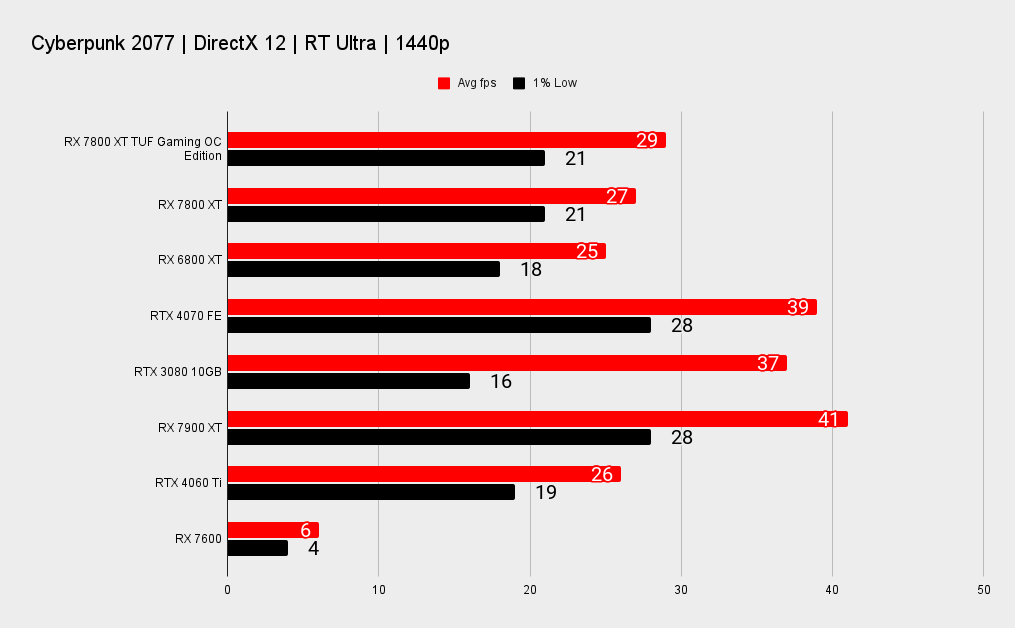
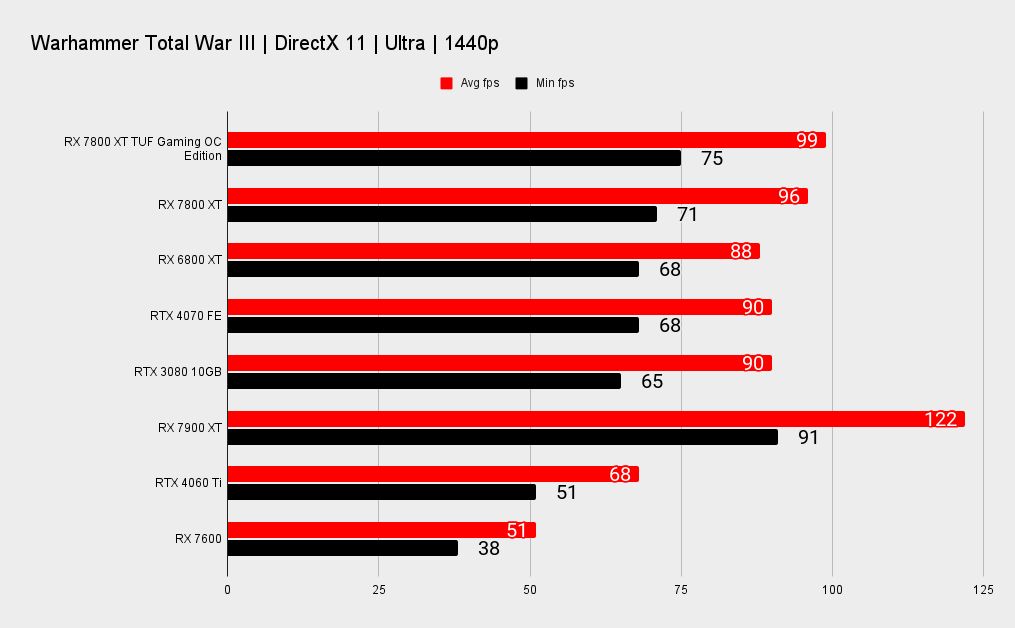
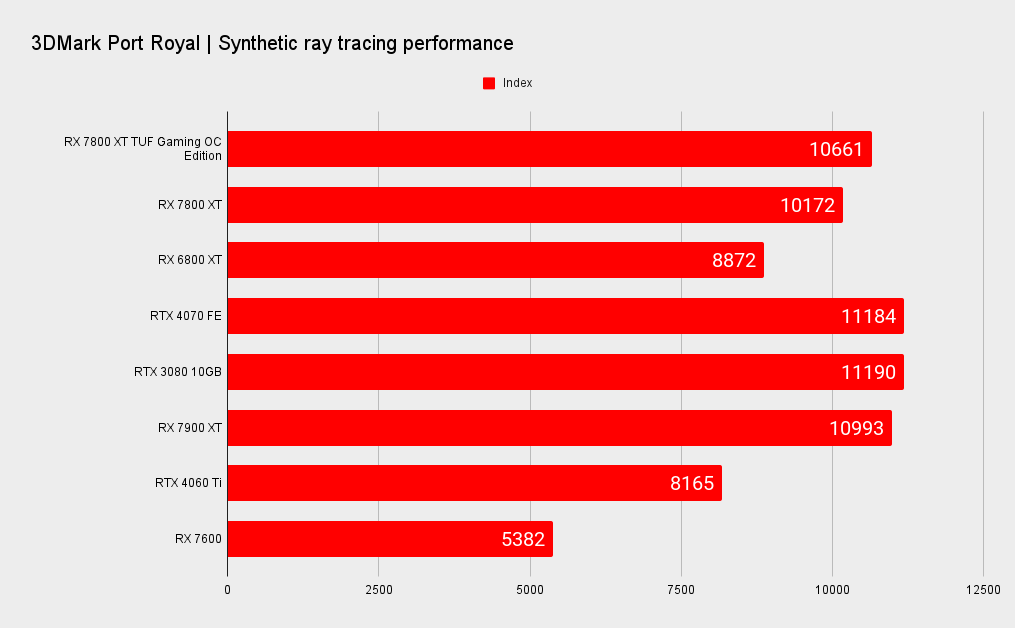
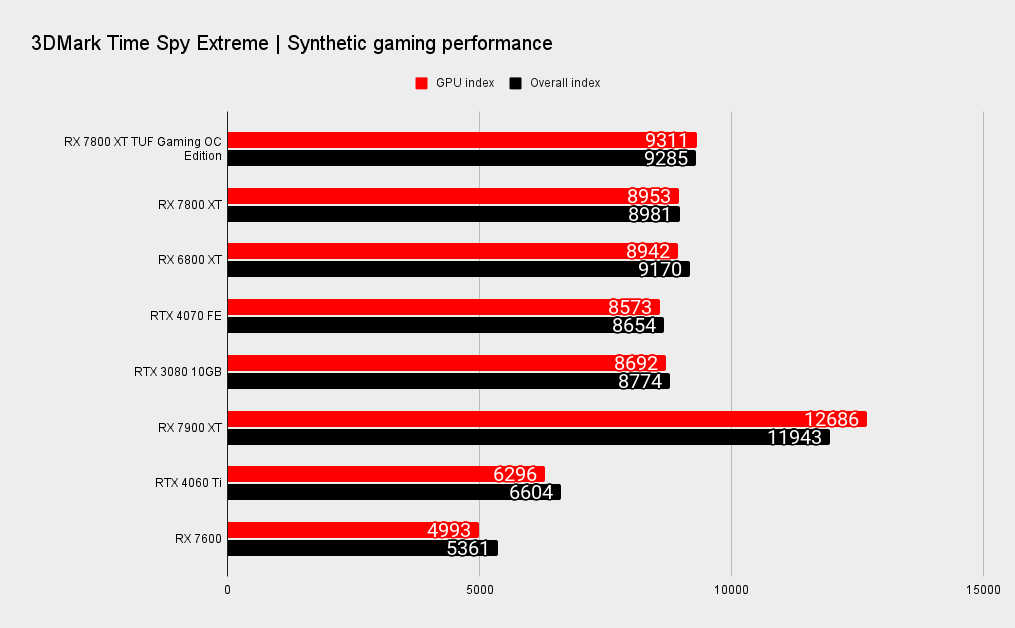
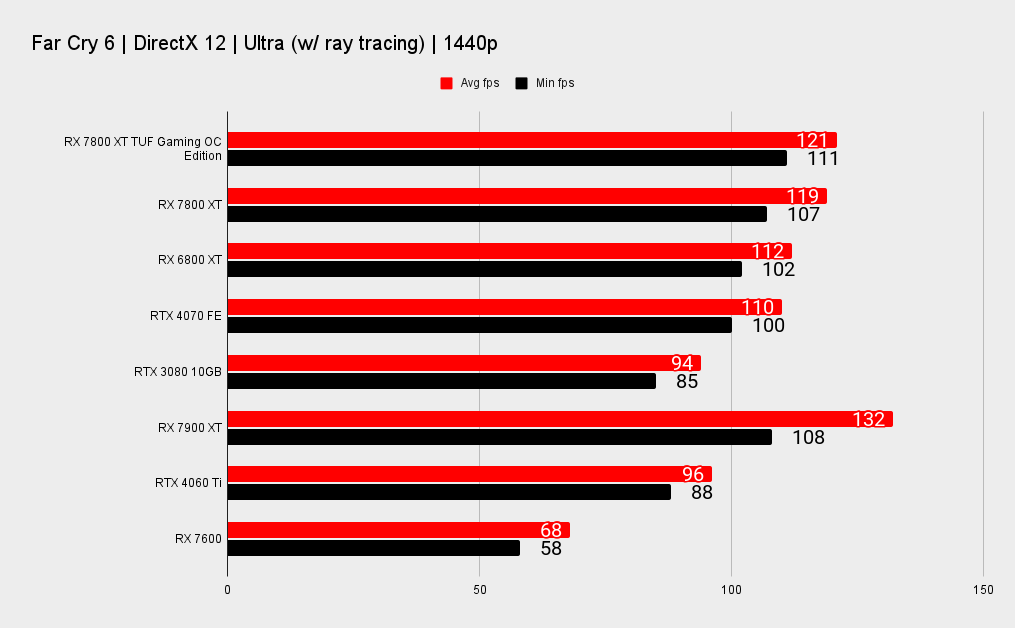
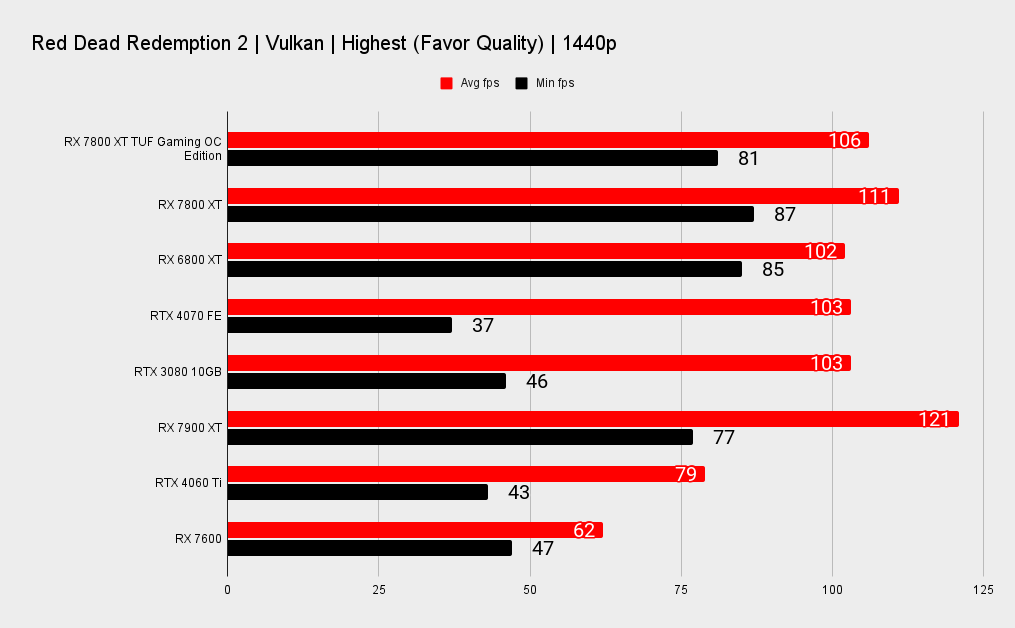
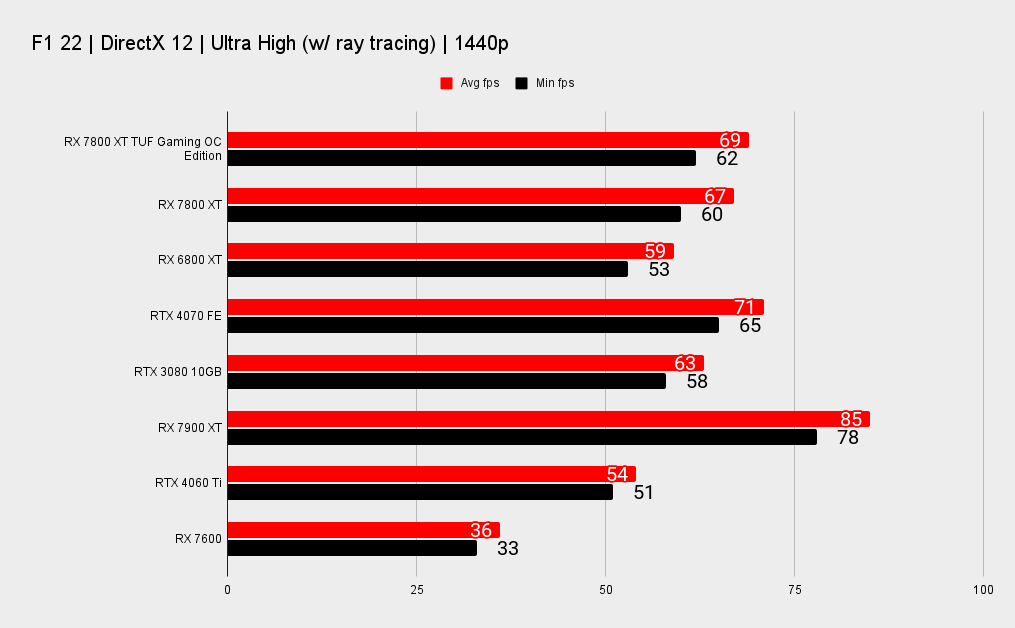
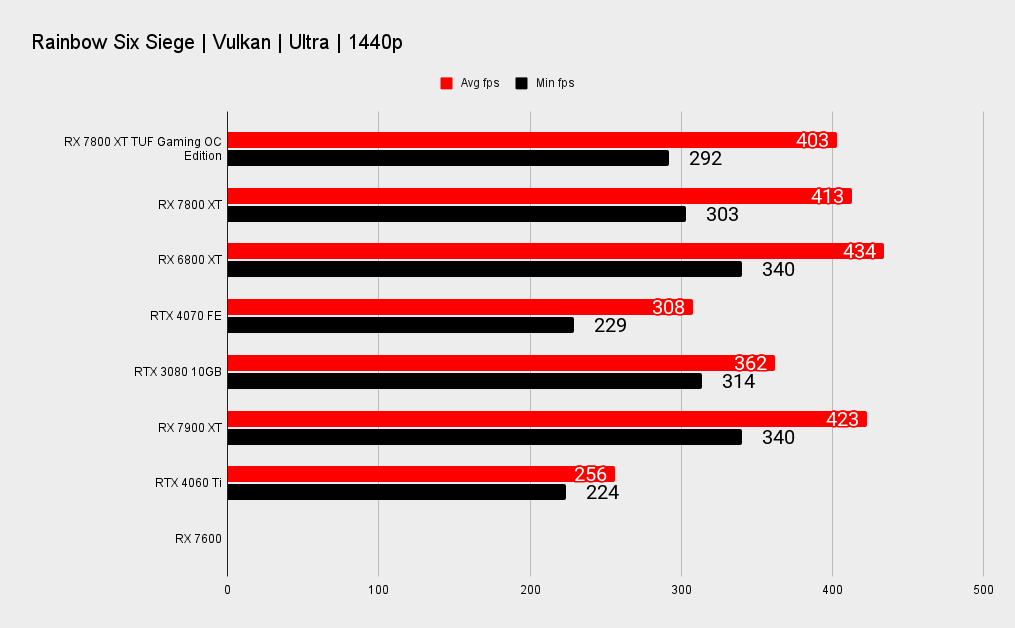
4K performance
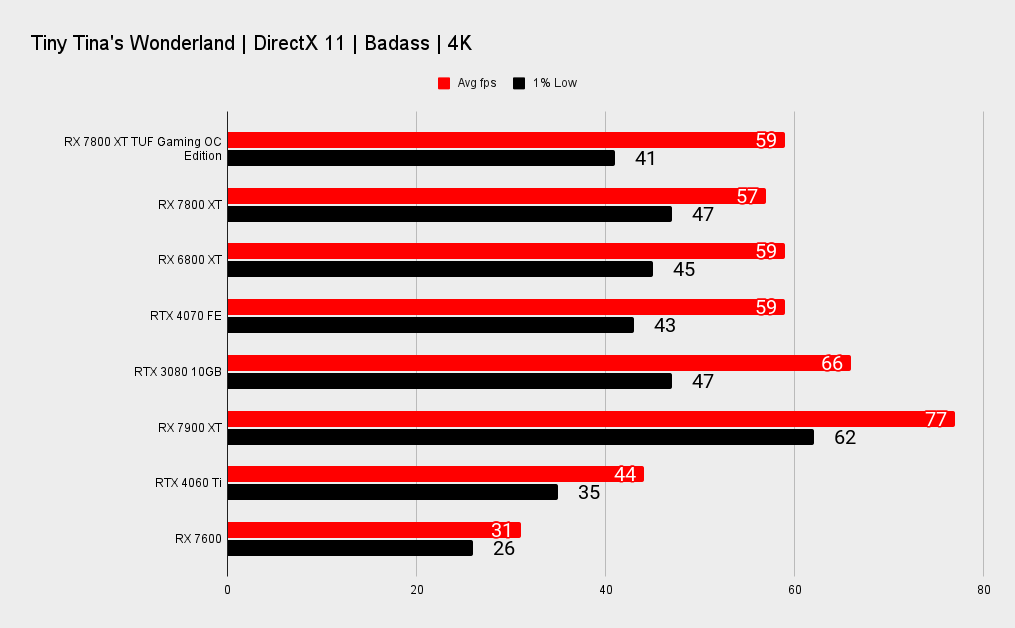
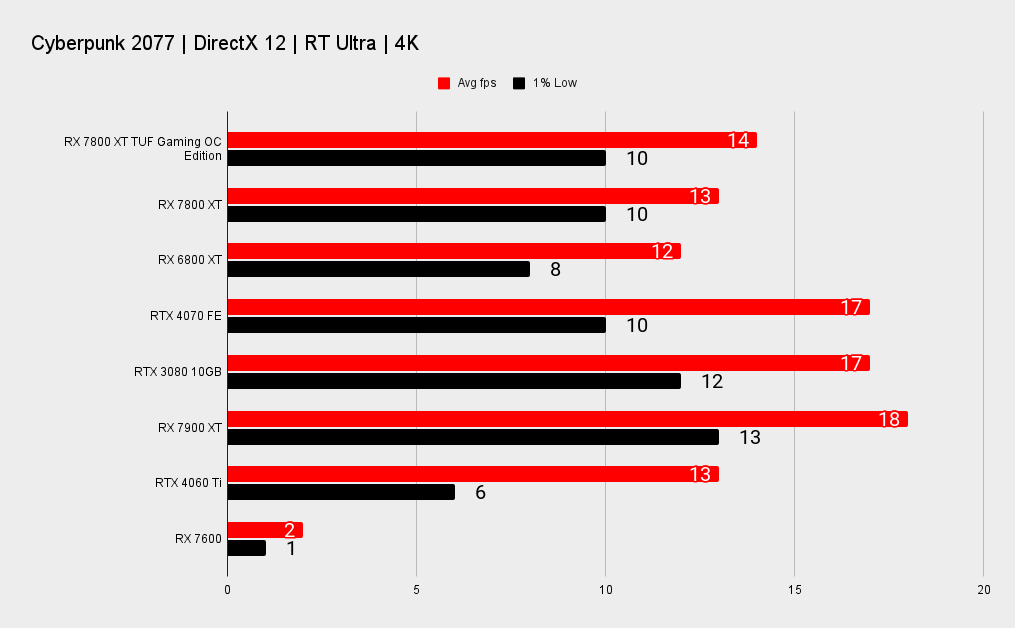
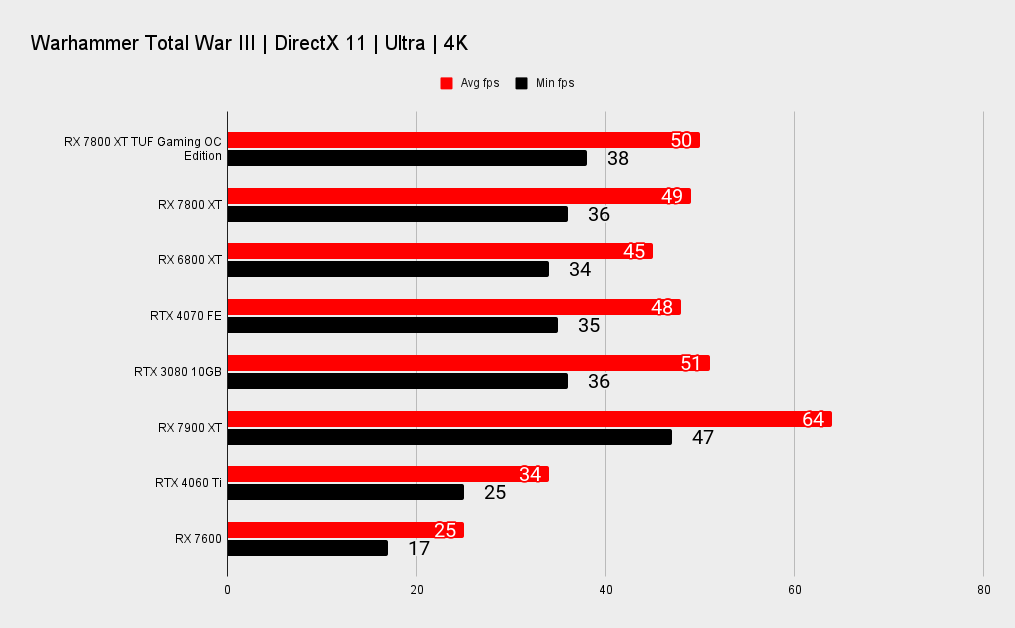
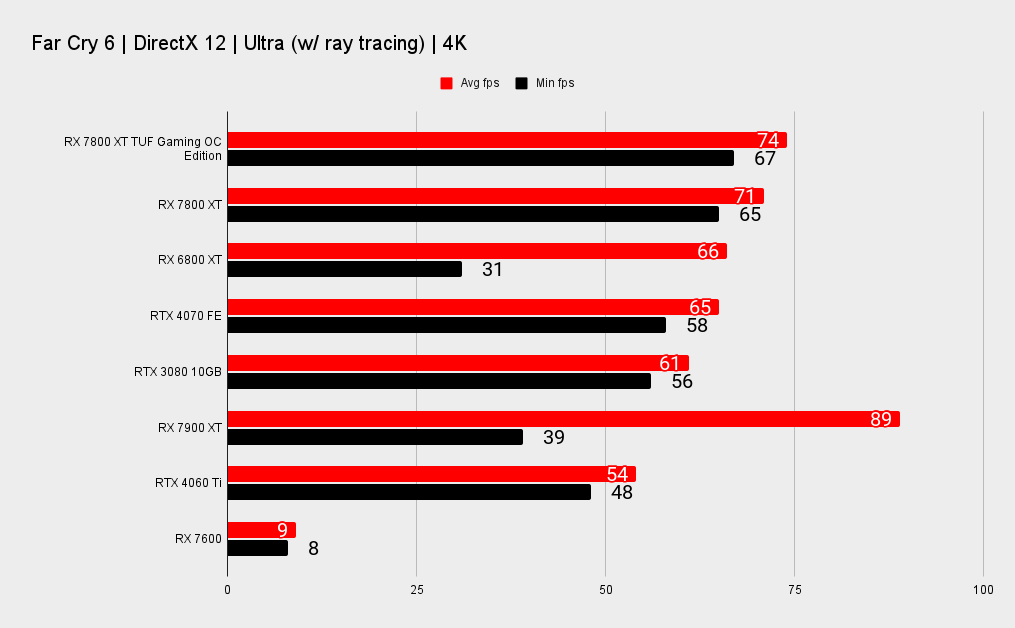
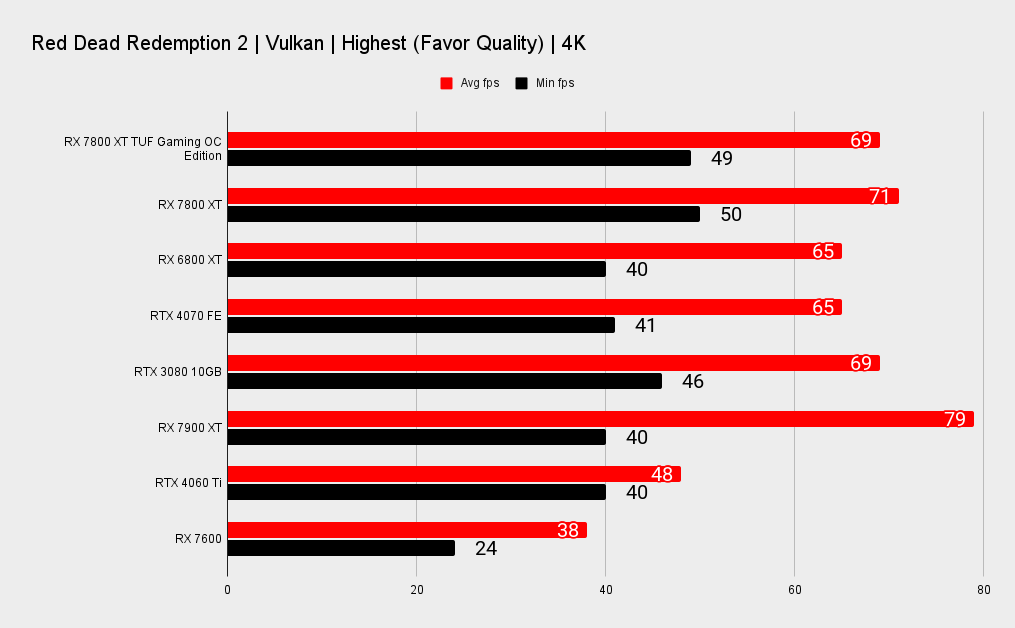
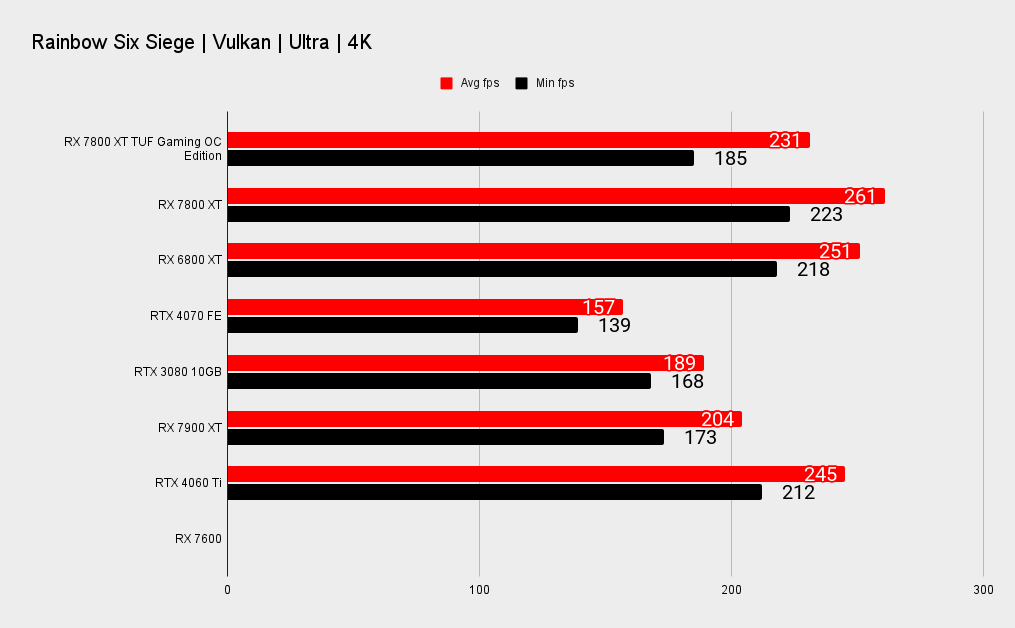
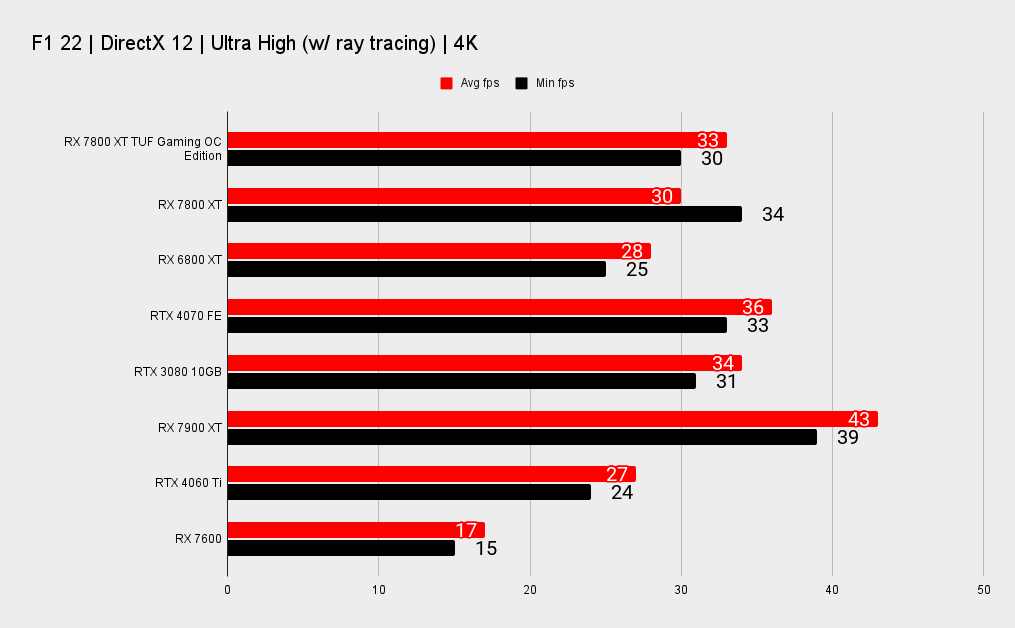

Thermal and power performance
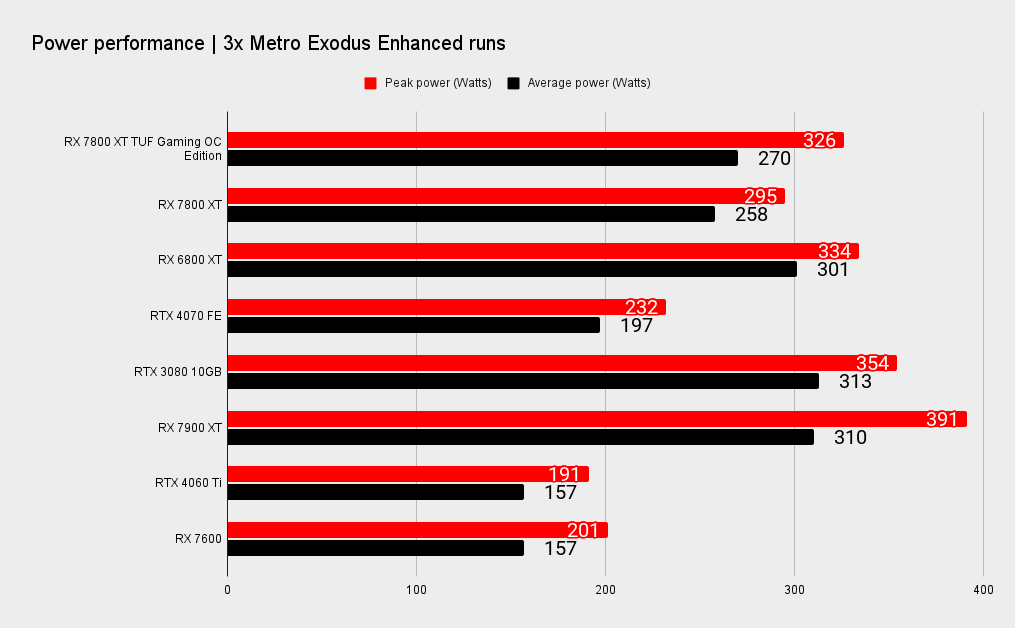
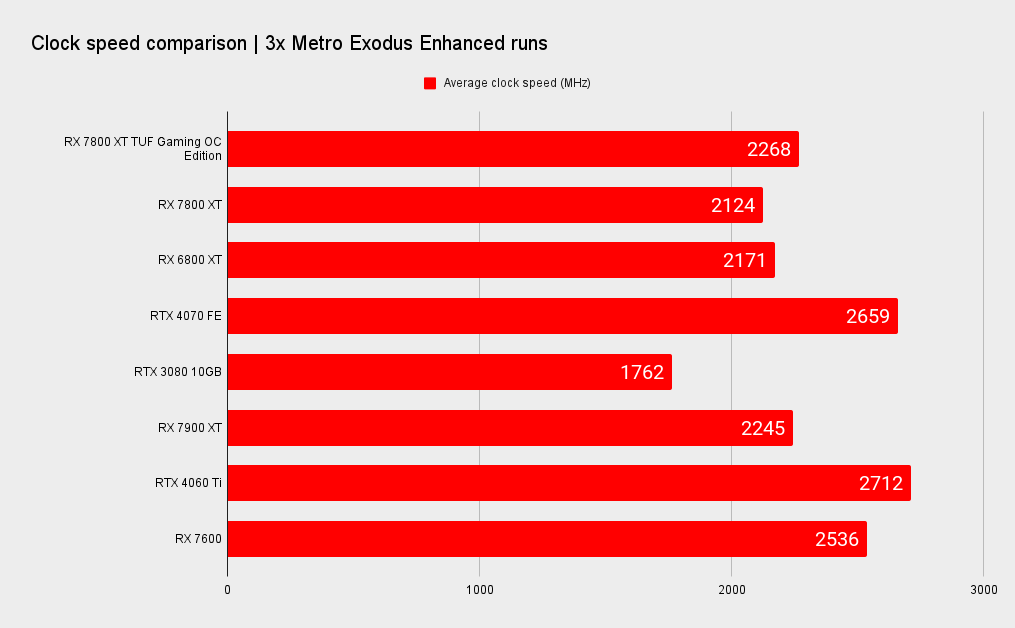
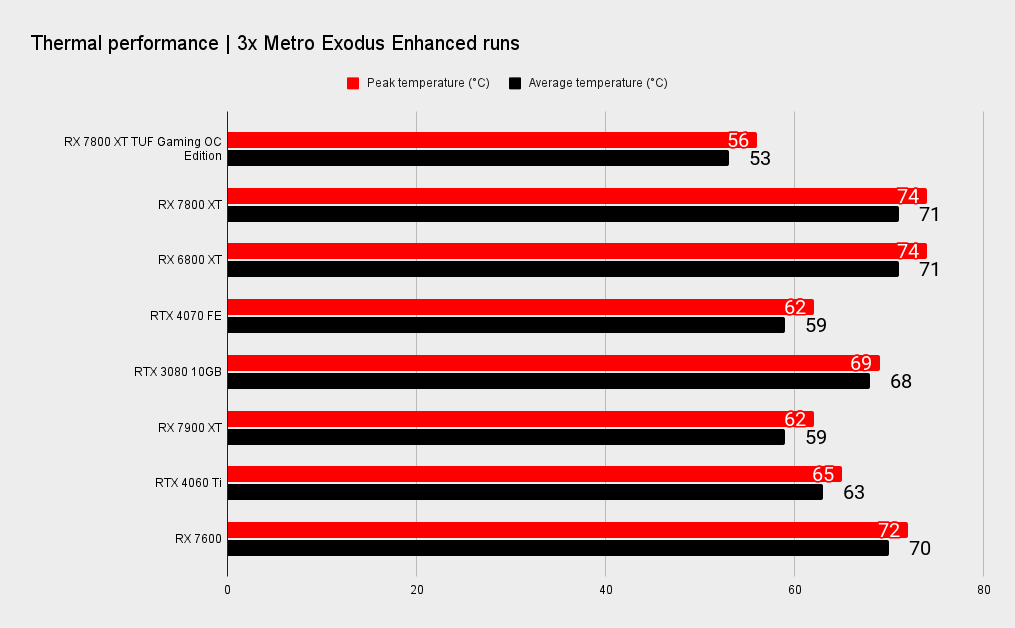
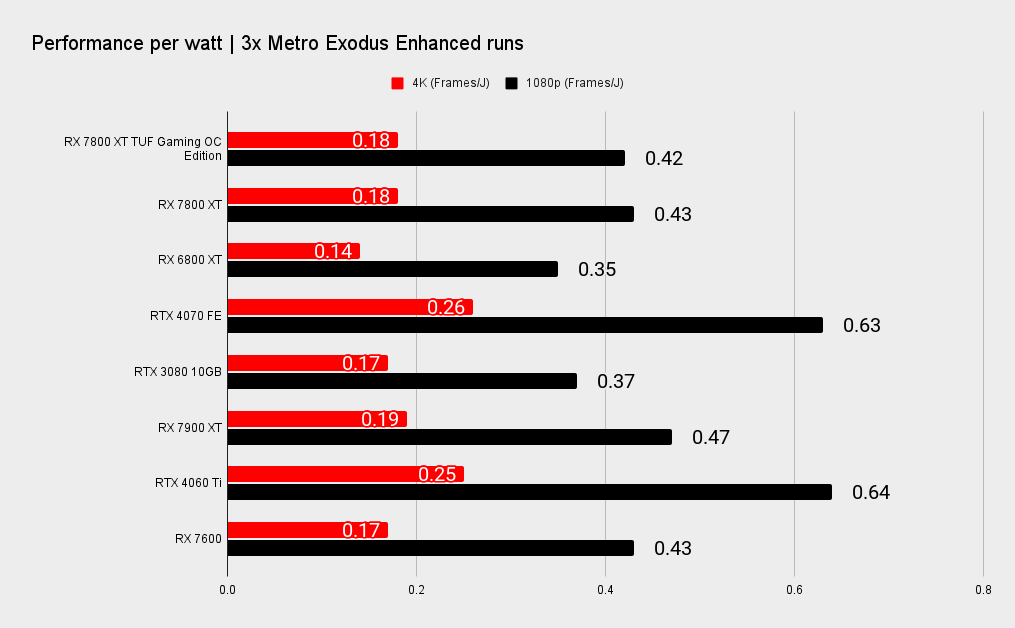
There's definitely room to push clocks further yourself. This card is aimed at those that might to do that. Though, be warned, you can push the card too far and experience diminishing returns for the increased power demands—power/performance is not a linear curve. I tried out a simple 2,799MHz GPU core overclock on the GPU, simultaneously pushing the memory up to 20Gbps effective, while pushing the power limit up to 115%. That might sound like a large step-up over the factory OC, but it's only around 100MHz+ on average when actually gaming.
Overclocking performance
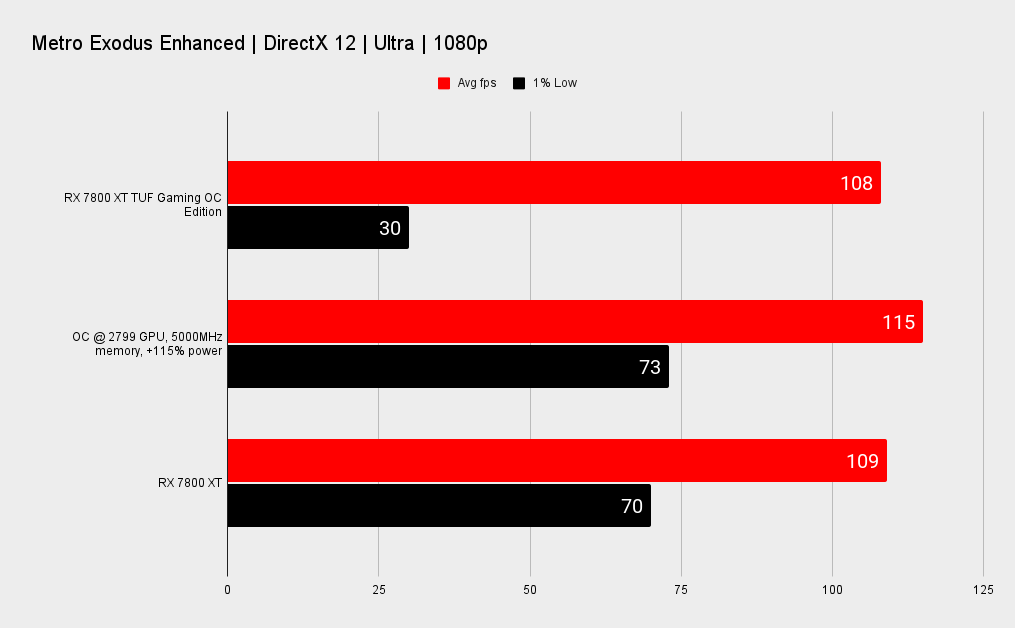
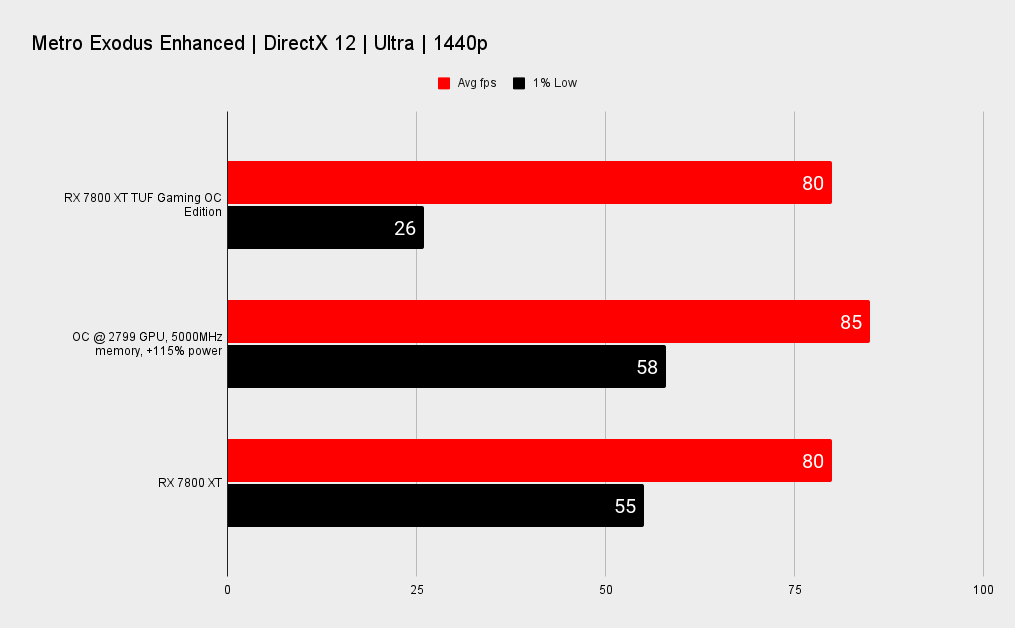

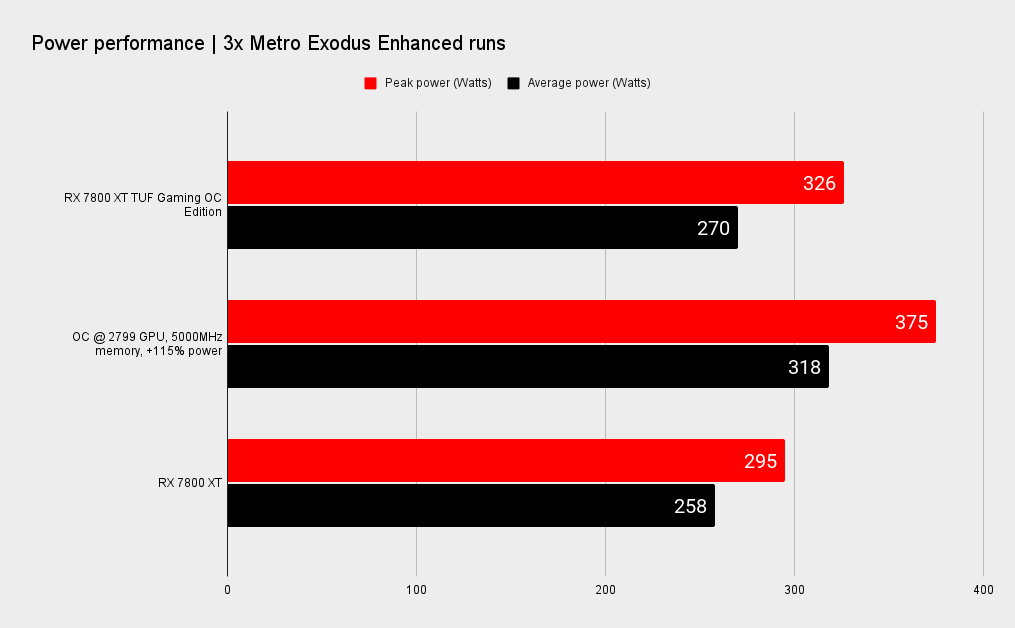
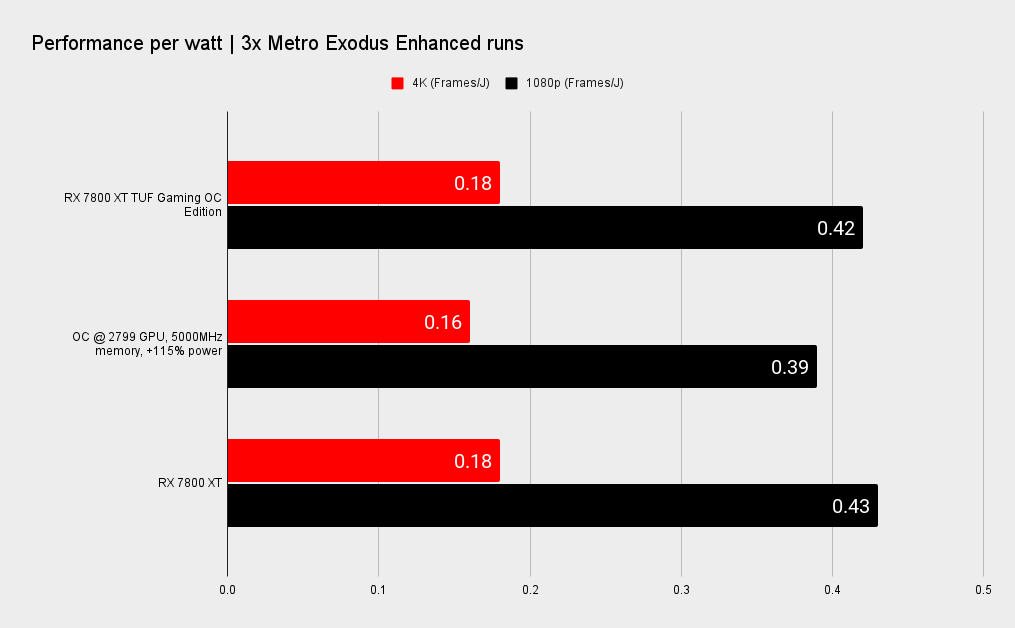
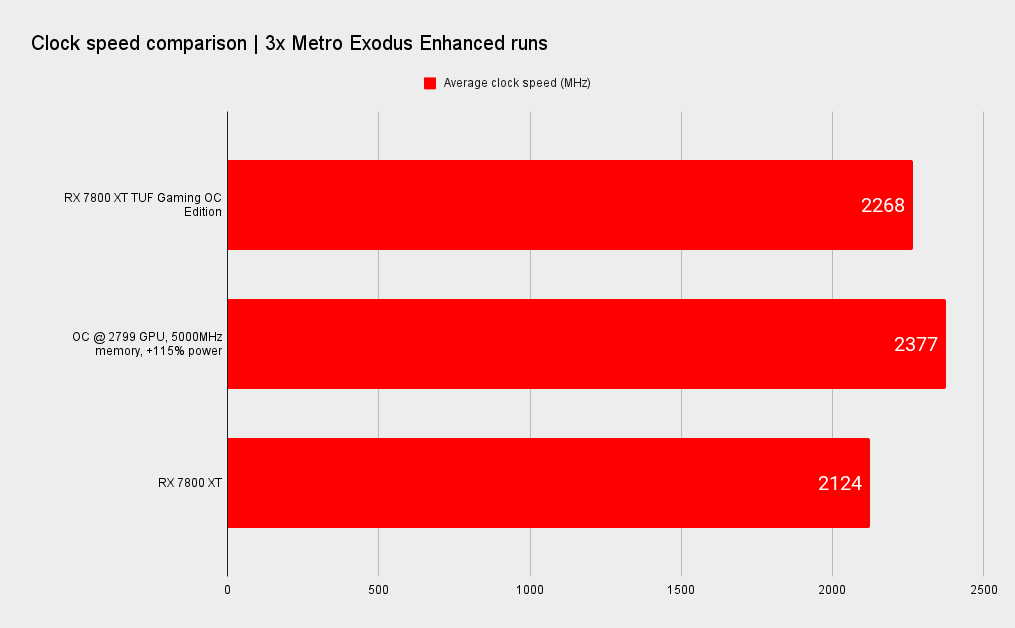
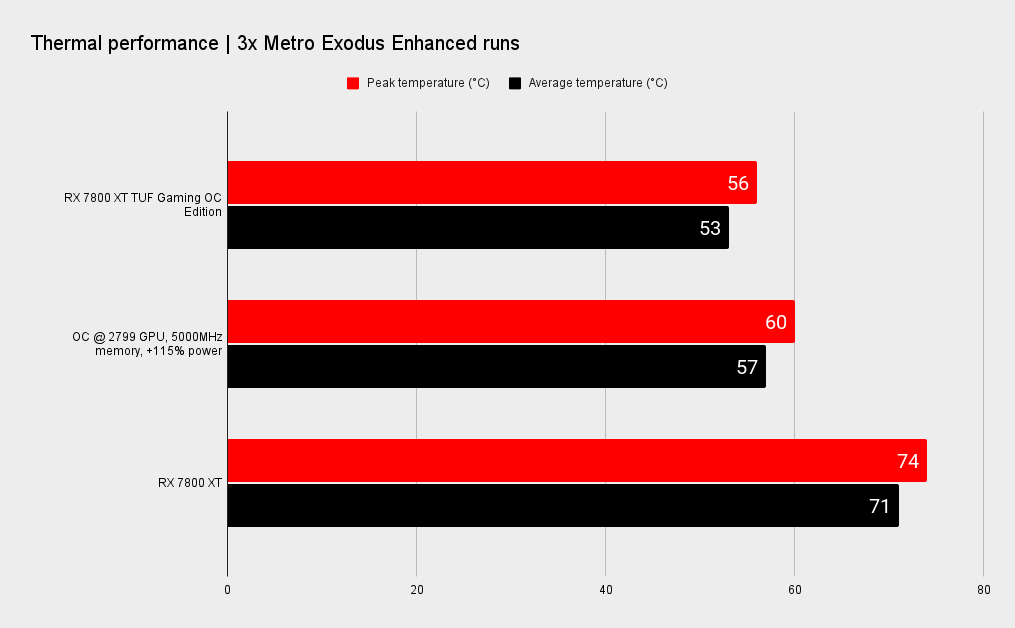
For my manual OC efforts, the card does run a fair bit quicker at 1080p and 1440p. A couple of frames on top of the factory OC, and thus even further ahead of the reference RX 7800 XT. Though it gobbles up significantly more power for that bump in performance. It also runs a touch hotter, though in reality this cooler isn't too phased even by the increased power surging through the card with the manual OC enabled. You could absolutely tailor your overclock a little more than I have here, ideally bringing that power limit down as far as possible before you run into instability.
This TUF Gaming is still well priced versus an RTX 4070. These cards perform very similarly, with the RX 7800 XT gaining an edge in some purely rasterised games, though the RTX 4070 has the added advantage of ray tracing performance, greater efficiency, and Nvidia's DLSS and Frame Gen features. AMD has its own answer to the latter in FSR and Fluid Motion Frames, but generally Nvidia's upscaling and frame generation is seen as the preferred option by many, as evident by the recent rush to mod Starfield's settings menu with DLSS.
A cheaper, reference-priced RTX 4070 will still require a sum more cash than this fully-kitted out RX 7800 XT, but you'll likely receive a less capable cooler for siding with the green team. Given the extra efficiency of Ada GPUs, however, that may not be such a brutal trade off as it might otherwise seem.
Still, the RX 7800 XT does appear to pull a lead over the RTX 4070, and that's even more true of this more expensive model. There is another benefit to the RX 7800 XT, too: it comes with 16GB of memory across a wider 256-bit bus to the RTX 4070's 12GB and 128-bit bus. The impact of that memory superiority isn't as pronounced as, say, between this and the 8GB RTX 4060 Ti, but it's an advantage that could come into play more as these cards get a bit older and games demand ever more memory.
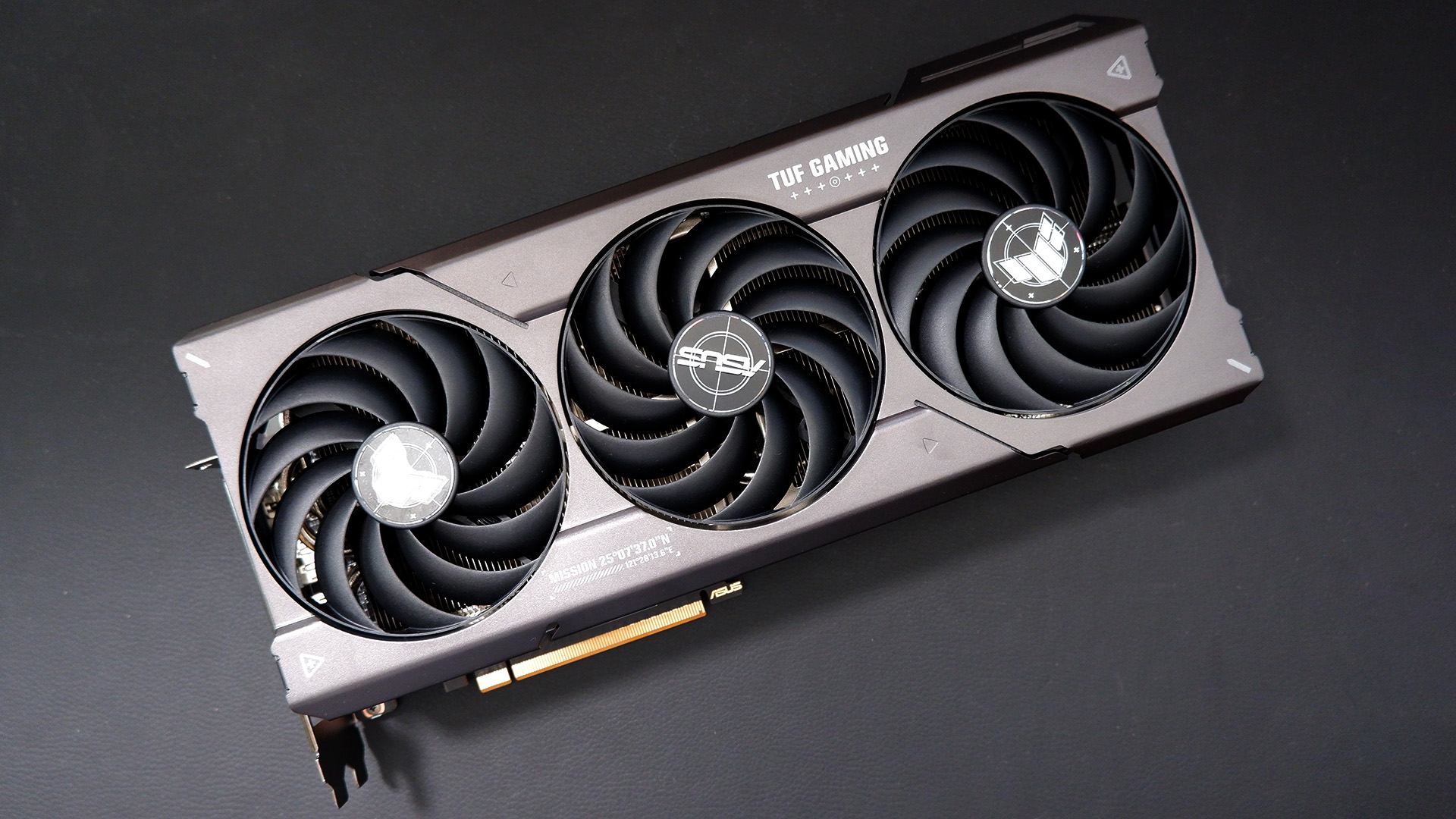
Nevertheless, this isn't an exclusive benefit to the TUF Gaming model. A reference priced RX 7800 XT will deliver all that in a cheaper package, and grabbing a $500 RX 7800 XT at launch is the better value proposition frame-for-frame. There are also third-party cards with factory overclocks going for around that $499 MSRP, which is a rarity. So you have to weigh up what you're getting with this TUF Gaming beast.
Thankfully, Asus isn't asking for too much extra cash for the TUF Gaming RX 7800 XT, at least in the US. If you're struggling to find a reference card at MSRP, the Asus makes for an impressively cooled stand-in at an extra $20–$30. My natural inclination is always a little on the fence about factory overclocked cards that creep up in price, often rubbing shoulders with higher-end models, but at least AMD's pretty competitive reference price keeps the TUF Gaming OC Edition from irrelevancy.
Though it's notably much pricier in the UK at £550. That really is a big premium to pay for this version, and I feel it's less worth the money for us Brits.
If you absolutely require quiet or cool operation, and you're dead set on this AMD GPU powering your PC, the TUF Gaming OC Edition is a very competent graphics card for what feels like a fair price for the chunky cooler lumped on it.
A monstrous shroud keeps the TUF Gaming RX 7800 XT OC Edition extremely cool for barely a whisper. And it's not too prohibitively priced in the US for its big build.

Jacob earned his first byline writing for his own tech blog. From there, he graduated to professionally breaking things as hardware writer at PCGamesN, and would go on to run the team as hardware editor. He joined PC Gamer's top staff as senior hardware editor before becoming managing editor of the hardware team, and you'll now find him reporting on the latest developments in the technology and gaming industries and testing the newest PC components.
